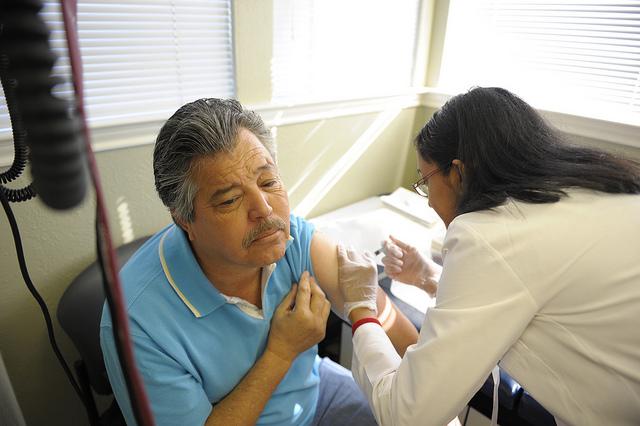A large, 7-year epidemiologic study from the United Kingdom suggests that people who have type 2 diabetes can significantly lower their risk of major cardiovascular events such as stroke and heart failure during the influenza season by getting the flu vaccine, according to a report this week in the Canadian Medical Association Journal (CMAJ).
Researchers from Imperial College London found that type 2 diabetes patients who were vaccinated had a 30% lower risk of hospitalization for stroke, a 22% lower risk for heart failure, and a 15% lower risk for pneumonia or flu, compared with their unvaccinated counterparts. Also, the vaccinated patients had a 24% lower risk of death from any cause during the flu season.
The research team took a number of steps to prevent misleading results that could be caused by undetected differences between the vaccinated and unvaccinated groups. These steps included examining rates of cardiovascular events in the summertime, when flu activity is low and vaccination would not be expected to have any effect on cardiovascular event rates.
The authors, led by Eszter P. Vamos, MD, PhD, observe that diabetes patients are at high risk for flu complications and that they—like elderly people in general—may have an impaired immune response to flu vaccines. The few studies that examined flu vaccine effectiveness (VE) in diabetes patients have been inconclusive, and no previous studies have assessed the effects of flu vaccination on cardiovascular events in those with type 2 diabetes, the researchers wrote.
Large clinical practice database used
For their retrospective study, the team used England's Clinical Practice Research Datalink, billed as one of the world's largest electronic troves of primary care records. They obtained an extract of records for type 2 diabetes patients at 300 family practices that have a link to non-primary care databases, including national hospital and mortality statistics systems.
The authors examined the patients' rates of hospital admission for myocardial infarction (MI), stroke, heart failure, and pneumonia or influenza, as well as all-cause death, during the 7 years from September 2003 through August 2010. The antigenic match between the circulating and vaccine strains of flu was good in all those years except 2003-04 and 2009-10, the latter being the time of the 2009 H1N1 pandemic.
To try to ensure accuracy, the team adjusted statistically for differences between the vaccinated and unvaccinated groups in many characteristics, including age, sex, duration of diabetes, number of other health conditions, smoking status, medications, blood pressure, flu vaccination the previous year, and others. In addition, they used their estimates of flu vaccine effects during the summer (when the vaccine should not affect the risk of cardiovascular events) to adjust for residual confounding of effects observed during the flu season.
Vaccine recipients older, sicker
A total of 124,503 type 2 diabetes patients were included in the study, yielding 623,591 person-years of observation over the 7 years. Overall seasonal flu vaccine uptake in the group ranged from 63.1% to 69.0% during that time. The patients had a total of 5,142 hospital admissions for MI, 4.515 for stroke, 14,154 for pneumonia or flu, 12,915 for heart failure, and 21,070 deaths.
Compared with the unvaccinated patients, the vaccinated ones were generally older and sicker, had more coexisting conditions, and took more medications, but they had lower levels of cholesterol and glycosylated hemoglobin, the authors found.
With the first round of statistical adjustments, those for known differences between the two groups, the vaccinated group was shown to have a significantly lower risk for all the outcomes during the flu season, including all-cause mortality. For example, vaccinees had a 22% lower risk of acute MI (incident rate ratio [IRR], 0.78; 95% confidence interval [CI], 0.65 to 0.93).
This first set of adjusted results also showed the two groups had differences in risk during the summer, including significantly lower all-cause mortality and lower hospitalization rates for pneumonia or flu. These findings suggested that the adjustments for inter-group differences were not sufficient, the authors said.
A lower risk for most outcomes
After the team used the estimates of summer risk levels to adjust the results further, the findings changed somewhat and in varying directions, but the vaccinees still had a lower risk for all flu-season outcomes except MI.
During the flu seasons, the vaccinated patients had a 30% lower hospitalization rate for stroke (IRR, 0.70; 95% CI, 0.53 to 0.91), a 22% lower rate for heart failure (IRR, 0.78; 95% CI, 0.65 to 0.92), and a 15% lower rate for pneumonia or flu (IRR, 0.85; 95% CI, 0.74 to 0.99). The all-cause death rate was 24% lower (IRR, 0.76; 95% CI, 0.65 to 0.83).
For MI, vaccination was associated with a 19% risk reduction, but because of a wide confidence interval, the effect didn't quite meet the significance criterion (IRR, 0.81; 95% CI, 0.62 to 1.04).
Discussing limitations of the study, the researchers said the adjustments they made by using the summertime risk estimates probably did not eliminate all the residual confounding.
Vamos, the lead author, commented in an Imperial College press release, "Most flu deaths every year occur in people with pre-existing health conditions such as type 2 diabetes. This study suggests the vaccine may have substantial benefits for patients with long-term conditions. Not only might it help reduce serious illness such as stroke—and possibly heart attack—in high-risk individuals, but it may also reduce the risk of death in the flu season."
The release notes that flu has been shown to raise the risk of MI or stroke in patients who have cardiovascular disease, though it's unclear why.
Also in the release, co-senior author Azeem Majeed, MD, said, "Although there have been questions surrounding the effectiveness of the flu vaccine in recent years, this research demonstrates a clear advantage for people with diabetes."
Vamos EP, Pape UJ, Curcin V, et al. Effectiveness of the influenza vaccine in preventing admission to hospital and death in people with type 2 diabetes. CMAJ 2016 (early online publication Jul 25) [Full text]
See also:
Jul 25 Imperial College London press release






















